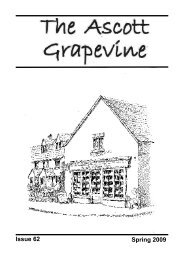Winter 2010 - Ascott-under-Wychwood
Winter 2010 - Ascott-under-Wychwood
Winter 2010 - Ascott-under-Wychwood
Create successful ePaper yourself
Turn your PDF publications into a flip-book with our unique Google optimized e-Paper software.
I’m not a scientist, but I do question<br />
our acceptance of the opinion that<br />
global warming is caused solely by<br />
man’s activities and that this is a proven<br />
fact. Why? Probably because I’m a<br />
natural sceptic and always tend to<br />
question everything that I’m told, especially<br />
if it’s a politician doing the<br />
telling and particularly if it’s seen as an<br />
excuse to raise ‘green’ taxes and waste<br />
vast sums of money building inefficient<br />
and unsightly wind farms.<br />
Yes, I accept that carbon dioxide is<br />
a greenhouse gas, as is methane and<br />
both are produced as a result of human<br />
activity, but water vapour is possibly<br />
more important in the greenhouse effect<br />
and is not generated to excess by<br />
human activity. Anyway, the amount<br />
of carbon dioxide that we add to the<br />
atmosphere is small compared with the<br />
total produced by nature. One belch by<br />
a large volcano will put far more carbon<br />
dioxide into the atmosphere than<br />
we humans do each year. Carbon dioxide<br />
is a natural component of our atmosphere<br />
and all plants require it for<br />
growth, they combine it with water and<br />
through photosynthesis manufacture<br />
the sugars they require.<br />
Today, when compared with our<br />
geological past, the earth is much cooler,<br />
the icecaps much larger and the seas<br />
cover less land. Indeed we are still in<br />
an ice age, but enjoying a warmer interglacial<br />
period. There is no less ice at<br />
the Earth’s poles today than there was<br />
GLOBAL WARMING<br />
thirty years ago. It is also interesting to<br />
note that there has only been ice on<br />
earth’s surface for less than 20 % of its<br />
history.<br />
In Europe we suffered a ‘Little Ice<br />
Age’ from 1400 to 1850, with the coldest<br />
period being in the 1600’s so we<br />
should be expecting temperatures to<br />
rise and glaciers to retreat as they have<br />
been doing unevenly for the last 250<br />
years. Prior to that we enjoyed a six<br />
hundred year period of warming which<br />
enabled grapes to be grown by the<br />
Romans as far north as Hadrian’s Wall<br />
and allowed the Vikings to settle in<br />
parts of Greenland which are now ice<br />
bound. More recently there have been<br />
shorter periods of warming and cooling<br />
which do not seem to correlate<br />
with mankind’s industrial activities.<br />
We are currently in the eighth year of<br />
a period of global cooling.<br />
Climate is cyclical. In the current<br />
era these cycles tend to be one hundred<br />
thousand years long, with ninety thousand<br />
years of variable glacial conditions<br />
followed by ten thousand years of<br />
warming. We are currently at the end<br />
of the current warming period, so perhaps<br />
we should be expecting another<br />
ice age! Perhaps the carbon we emit<br />
might keep us warm a little longer.<br />
I realise my views may be regarded<br />
as ‘deranged.’ if you think so please<br />
use the next issue of the Grape Vine to<br />
shoot me down in flames, after all I’m<br />
not a scientist just a cynic.<br />
Page 30 Don’t forget about the <strong>Ascott</strong> website:



